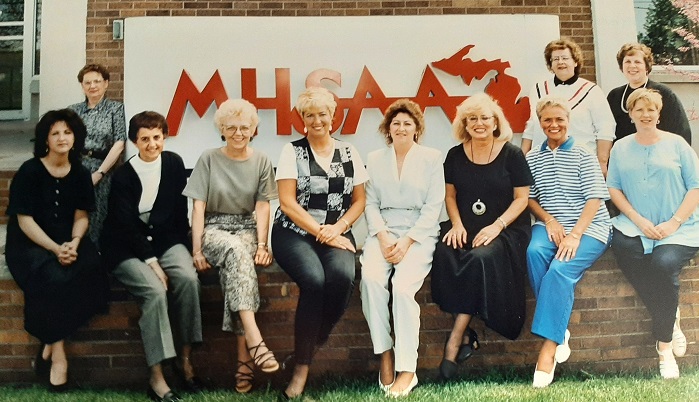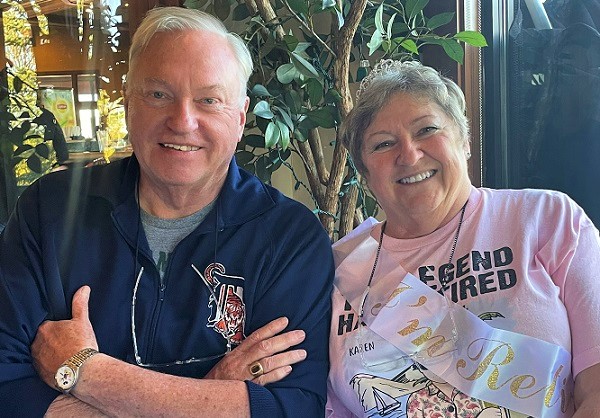
MHSAA Fall Practices to Begin with Nearly 95,000 Athletes, Notable Rules Changes
By
Geoff Kimmerly
MHSAA.com senior editor
August 5, 2022
Nearly 95,000 athletes statewide are anticipated to begin practices Monday, Aug. 8, kicking off the Fall 2022 season across nine sports for which the Michigan High School Athletic Association sponsors postseason tournaments.
Teams in girls and boys cross country, football, Lower Peninsula girls golf, boys soccer, Lower Peninsula girls swimming & diving, Upper Peninsula girls tennis and Lower Peninsula boys tennis, and girls volleyball may begin practice Monday. Competition begins Aug. 15 for golf and tennis, Aug. 17 for cross country, soccer, swimming & diving and volleyball, and Aug. 25 for varsity football. Football teams at all levels must have 12 days of preseason practice – over a period of 16 calendar days – before their first game.
The beginning of a school year always is accompanied by at least a handful of notable playing rules changes or adjustments regarding MHSAA Tournament competition. Among the most noteworthy this fall will be the addition of a “third half” rule in soccer, which will allow an athlete to play in a combined three halves across two matches and multiple levels (varsity, junior varsity, freshman) on the same day, any day of the week. This is similar to the fifth-quarter rules in football and basketball approved in recent years to help programs with low athlete numbers still have enough to continue fielding teams at multiple levels – generally with underclassmen playing on multiple teams to keep rosters filled.
There is also an enhanced penalty beginning this fall for violating the fifth-quarter or third-half rules: Violators must forfeit the contest during which the violation took place (either varsity or subvarsity), and that head coach in violation will be ineligible for the next day of competition.
The change to a playing rule most likely to be noticed by spectators comes in football, where intentional grounding has been adjusted to allow for a passer to throw an incomplete forward pass to conserve yardage – in essence, to throw the ball away to avoid being tackled for a loss, even when a receiver isn’t present near the pass’s destination – if the passer is outside the free-blocking zone, or “pocket,” and as long as the pass reaches the line of scrimmage or extension of the neutral zone beyond the sideline. This change makes the high school intentional grounding rule mirror those at the collegiate and professional levels, and was made to conserve the amount of contact by defensive players with passers.
A second football rule change also was made with safety in mind, as the chop block – which is illegal – was redefined to include any combination block by multiple teammates against the same opponent where one of the blocks is above the waist and the other is below the waist. Previously, the knee (instead of the waist) was the determining factor on a chop block. This change also is expected to assist officials in enforcing the rule because deciding if blocks occur above and below the waist is more straightforward than using the knee to decide if an infraction occurred.
Another football rule change will be noticeable during the MHSAA 11-Player Finals, as head coaches for the first time will be allowed one challenge per game, with the play in question then reviewed with video replay. The challenge will cost that team a timeout if the original outcome is confirmed. Coaches will be allowed to challenge the following: complete/incomplete passes, if a runner/receiver was in/out of bounds, a runner who is ruled not down, the forward progress spot as it relates to the yard to gain, which player first touched a kick, the recovery of a ball in/out of bounds, if a pass was forward or backward, and penalties for illegal forward pass, targeting or illegal helmet contact, and pass interference only as it relates to the pass being previously tipped. All potential scores and turnovers will remain automatically reviewed by replay booth officials.
Three more notable rules changes for fall sports also affect MHSAA Tournament competition.
There is a new qualification process for divers seeking to advance to Lower Peninsula Finals. In each of the three divisions, each Regional will be guaranteed 10 qualifiers for the Finals, with six more “floating” qualifier entries to be distributed to the Regionals that have one of the previous year’s top six returning Finals divers in their fields. If a team changes division from the previous season, any floating top-six spots are added to the six already allowed in the school’s new division.
In golf, the maximum number of strokes allowed per hole during MHSAA Tournament play has been reduced from 12 to 10. Also, teams will be allowed two school-approved coaches to be present and actively coaching during postseason rounds.
In tennis, the number of players who may be seeded at No. 1 singles was increased to seven if there are between 21-23 players in the field, and eight if the field includes 24 or more players at that flight. The No. 1 singles flight is the only flight that allows for individual qualifiers from Regional play, often making it larger than the other seven flights at the Finals.
The 2022 Fall campaign culminates with postseason tournaments beginning with the Upper Peninsula Girls Tennis Finals during the week of Sept. 26 and wraps up with the 11-Player Football Finals on Nov. 25 and 26. Here is a complete list of fall tournament dates:
Cross Country
U.P. Finals – Oct. 22
L.P. Regionals – Oct. 28 or 29
L.P. Finals – Nov. 5
11-Player Football
Selection Sunday – Oct. 23
Pre-Districts – Oct. 28 or 29
District Finals – Nov. 4 or 5
Regional Finals – Nov. 11 or 12
Semifinals – Nov. 19
Finals – Nov. 25-26
8-Player Football
Selection Sunday – Oct. 23
Regional Semifinals – Oct. 28 or 29
Regional Finals – Nov. 4 or 5
Semifinals – Nov. 12
Finals – Nov. 18 or 19
L.P. Girls Golf
Regionals – Oct. 3, 4, 5, 6, 7 or 8
Finals – Oct. 14-15
Soccer
L.P. Boys Districts – Oct. 12-22
L.P. Boys Regionals – Oct. 25-29
L.P. Boys Semifinals – Nov. 2
L.P. Boys Finals – Nov. 5
L.P. Girls Swimming & Diving
Diving Regionals – Nov. 10
Swimming/Diving Finals – Nov. 18-19
Tennis
U.P. Girls Finals – Sept. 28, 29, 30 or Oct. 1
L.P. Boys Regionals – Oct. 5, 6, 7 or 8
L.P. Boys Finals – Oct. 13-15
Girls Volleyball
Districts – Oct. 31-Nov. 5
Regionals – Nov. 8 & 10
Quarterfinals – Nov. 15
Semifinals – Nov. 17-18
Finals – Nov. 19
The MHSAA is a private, not-for-profit corporation of voluntary membership by more than 1,400 public and private senior high schools and junior high/middle schools which exists to develop common rules for athletic eligibility and competition. No government funds or tax dollars support the MHSAA, which was the first such association nationally to not accept membership dues or tournament entry fees from schools. Member schools which enforce these rules are permitted to participate in MHSAA tournaments, which attract more than 1.4 million spectators each year.

Jackson's Imprint on MHSAA Stretches 45 Years, Across 4 Executive Directors
By
Geoff Kimmerly
MHSAA.com senior editor
October 5, 2022
First impressions can be significant, as many a saying goes. And Karen Brown unknowingly provided one in 1978 that helped affect the course of athletics in this state over the next 40-plus years.
A Michigan State University student named Karen Leinaar had shown up at the Michigan High School Athletic Association for a meeting about a 5K road race she was planning that was unrelated to the MHSAA except that the building provided a good meeting place – and Brown, just a year out of high school, was the first person to greet her at the old Trowbridge Road headquarters.
Seeing someone her age immediately made Leinaar more comfortable. She ended up returning to that office several times over the years, registering as an MHSAA game official while still an MSU student and then starting a career in 1982 that has included nearly 40 years as a high school athletic director and two decades of shaping policy as part of the MHSAA Representative Council.
That’s the kind of impact that’s emanated from Karen Jackson, formerly Brown, and over the last 45 years as assistant to four of the five executive directors during the MHSAA’s 98-year history. Jackson finished that run with her retirement Friday.
“She was always one that would welcome you, and whether you walked into the office or called on the phone, she always had an answer that would calm you down or provide you with the information you needed,” said Leinaar, who currently is serving as interim athletic director at Frankfort High School in addition to her duties as executive director of the Michigan Interscholastic Athletic Administrators Association.
“I remember initially calling and needing something from Mr. Norris – it was always Mr. Norris – and she could answer the question,” Leinaar added, referring to retired MHSAA executive director Vern Norris, who served in that role from 1978-86. “You didn’t want to talk to scary Mr. Norris – Vern was a wonderful man, but he was like the superintendent or principal. Karen always had the answer. … It was always that smile that made you feel like you were more than welcomed, wanted in the office, and everything is going to be OK.”
 Jackson began at the MHSAA in June 1977, two days before her graduation from long ago-closed Harry Hill High School in Lansing.
Jackson began at the MHSAA in June 1977, two days before her graduation from long ago-closed Harry Hill High School in Lansing.
Her high school sports career amounted to about half a season on the Hill varsity volleyball team as a sophomore before she had to switch gears to begin working for the Lansing Regional Chamber of Commerce as part of a school co-op program.
Jackson graduated as a co-valedictorian of Hill’s Class of 1977. Despite her academic standing, she hadn’t received much guidance at school on the possibility of college. But she had a job offer from the Chamber – and also had heard from grade-school friend Deborah Norris (Vern’s daughter) about an opening at the MHSAA.
The MHSAA was offering more money, and Jackson was hoping to buy a car – and so at 18, she became the secretary for executive director Allen W. Bush.
The title has changed over the years, from secretary to the executive director, to executive assistant, to senior executive assistant. The MHSAA’s administrative processes obviously have changed, mostly because of technology, from everything done on paper and through the mail to just about everything conducted digitally over the internet.
But many of Jackson’s most important duties at the end of her tenure resembled those she was hired to carry out nearly half a century ago.
Setting Exemplary Expectations
Bush retired a year after Jackson began, and she then assisted Norris for his eight as executive director. She served with Jack Roberts through his 32 years as executive director from 1986-2018 and then for these first 3½ under current director Mark Uyl.
She was considered the “baby” of the MHSAA staff during her first 12 years, until she turned 30 and her support staff teammates declared she wasn’t the baby anymore during a Christmas party serenade. Just about 33 years later, she’s leaving as one of two people left who worked in the old offices before the MHSAA moved to another East Lansing headquarters at Ramblewood Drive in 1996.
School sports happen thanks to a Karen Jackson or two in every community -- people who provide the unseen support that makes these programs possible every day.
For the last 45 years, she’s provided a consistent anchor for service to 1,500 schools and millions of student-athletes across Michigan.
 “She’s shaped so much of what we’ve done,” said MHSAA assistant director Kathy Vruggink Westdorp, who joined the staff during the 2003-04 school year after more than two decades working for Grand Rapids-area schools. “Her service to schools was imperative to what she was doing, and it was a valuable part for our membership. Hers was such a dedicated service, such an exemplary service – finding solutions, to do what’s needed.”
“She’s shaped so much of what we’ve done,” said MHSAA assistant director Kathy Vruggink Westdorp, who joined the staff during the 2003-04 school year after more than two decades working for Grand Rapids-area schools. “Her service to schools was imperative to what she was doing, and it was a valuable part for our membership. Hers was such a dedicated service, such an exemplary service – finding solutions, to do what’s needed.”
There are file cabinets and libraries and hard drives at the MHSAA office, the contents of which are known by only a handful of people on Earth – and Jackson perhaps the most as she did most of the sorting and maintaining of those files over the years.
For a 1996 Lansing State Journal feature on the MHSAA’s support staff, Jackson (then Yonkers) explained “there are always new challenges, new issues and controversies. It never gets boring. In the past 19 years, we’ve slowly shifted from dealing with athletic administrators, principals and superintendents to dealing with legislators, attorneys and courts.”
The last 25 years has seen much of the work swing back to providing service directly to schools. And Jackson’s mind has become part MHSAA library and part card catalog of where to find those few snippets she might not recall immediately from the last half century.
“I guess what I’m proud of is being able to find things, to know where to find things and how to find things that other people don’t,” Jackson said. “Yes, the technology has changed everything. … We used to have more schools – they used to have 40-some Detroit public schools – and there was a whole era of (litigation), but it’s calmed down now.
“I liked what I did, and it kept me on my toes – that’s for sure.”
The MHSAA is rooted in its responsibilities as a championship and eligibility rules maker, and Jackson was involved in just about every communication in those areas during her time. Tournament changes are made at Representative Council meetings, and she’s reported the minutes for at least 150 of those, including piles of special sessions as the MHSAA managed sports through the COVID-19 pandemic. Eligibility waivers are requested at Executive Committee meetings, and she’s prepared somewhere north of 505 sets of minutes for those monthly sessions even as those agendas have grown in content substantially over the years.
Then there’s all of the correspondence from those four executive directors – all with the initials “kb” or “kj” to go with “AWB” or “VLN” or “JER” and “MU.” She also was in charge of MHSAA election ballots for 35 years, served as the lead organizer of cooperative programs, helped with football tickets for a time and briefly was part of the program-selling crew at early Football Finals at the Pontiac Silverdome.
“I think I’m pretty lucky, being on the Council and Executive Committee, that I’ve been able to work with her a lot. And most athletic directors, they may not even know who she is because they may not have contact with her or do anything with her – but she’s obviously been the unsung hero of that office,” said Vic Michaels, who serves as director of physical education & athletics for the Archdiocese of Detroit and has served on the Representative Council since 2003.
“She just does so much that you don’t really know about, especially with the Council. Whenever I need anything, Karen’s the one I call. She is the history, really. She’s the keeper of that.”
Unprecedented & 'Never to be Replicated'
A longtime co-worker of Jackson, Shirley Hytinen, retired in 1998 after just a few months more than 43 years. She too had worked for four executive directors, as she began in 1955 during the Charles E. Forsythe era.
Jackson surpassed Hytinen’s tenure a few years into Uyl’s, and can readily recall some of what stood out from all four directors she’s assisted.
Bush was “really stern” – he had served in the U.S. Marines – and she said he didn’t smile much until the day he announced his retirement, when it was “like a switch turned. He was smiling and happy and joking around.”
Norris was “the sweetest guy in the world.” Jackson had bought her first house in her mid-20s and was preparing to move in with only her dad and his motor home to assist, when Norris showed up to help at 7:30 a.m. that morning to provide another set of hands.
Roberts is known by Michigan administrators and national colleagues for his writing, and Jackson said jokingly she still “cringes” when she sees a yellow legal pad. She was an important proofreader and spent the majority of her career serving with her desk just a few paces away from that of the recent National Federation Hall of Fame selection, and she attended his induction this past summer and San Antonio.
 Roberts pointed out that during the 1980s, the MHSAA would conduct nine Executive Committee meetings, each averaging fewer than 10 requests for waivers. By the end of his 32 years, there were 11 Executive Committee meetings annually – with approximately 50 waiver requests presented on average. Still, he and Jackson were able to process the meeting minutes and continue to distribute those decisions within 24 hours.
Roberts pointed out that during the 1980s, the MHSAA would conduct nine Executive Committee meetings, each averaging fewer than 10 requests for waivers. By the end of his 32 years, there were 11 Executive Committee meetings annually – with approximately 50 waiver requests presented on average. Still, he and Jackson were able to process the meeting minutes and continue to distribute those decisions within 24 hours.
“Over the more than three decades that Karen and I worked together at the MHSAA, the work became increasingly more voluminous and complicated – and Karen kept finding ways to increase our efficiency and maximize our output,” Roberts said.
Like Norris when Bush was executive director, Uyl had been part of the MHSAA staff under Roberts since 2004 before eventually moving into the corner office. After those first 15 years together, Uyl knew what a valuable person he had just a few yards away to assist in his transition, and “he just says to do this” and allows his staff to run with it, which Jackson enjoyed.
Her duties have been shifted confidently, mostly to Jamie VanDerMoere, another longtime administrative assistant who is best-known to Michigan school sports people for her leadership with the annual wrestling championship tournaments.
Jackson recently was married to Jim Jackson, and they have plans as they close in on their first anniversary – they’re hoping to travel to Italy at some point and also The Masters in Augusta, Ga., next spring. “I’m not going to miss coming to work every day, but the people,” Karen Jackson said.
And many in school sports across Michigan, although they may not realize it, will miss the contributions Jackson has made to their community over the decades including the context she’s provided as thousands of decisions have been made.
“Not only her understanding of our regulations and the processes of our regulations, but understanding why we have those things in place – when someone does something 45 years, you get a lot of historical context,” Uyl said. “What’s made her so effective is understanding the why – and that to me is something that’s almost impossible to replace.
“When an organization has been around 98 years with only five directors, it says something to have worked for four out of the five. That will never be replicated again.”
PHOTOS (Top) From top left, Karen Jackson has been a mainstay of the MHSAA for decades – serving membership, working with administrators like Randy Allen and Gina Mazzolini or serving as assistant to executive directors like Jack Roberts (right) and Vern Norris. (Middle) Jackson, sitting fourth from left, was the “baby” of the MHSAA staff after joining when she was 18. (Below) Jackson and husband Jim have plans to travel in retirement. (MHSAA archives.)

